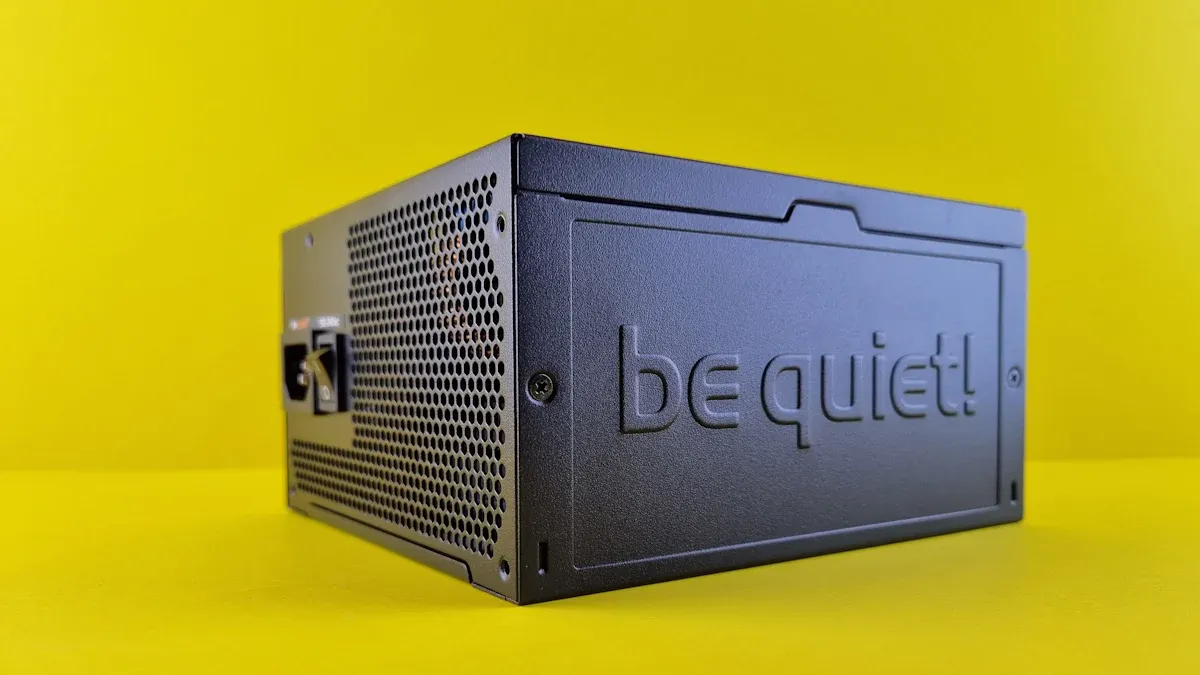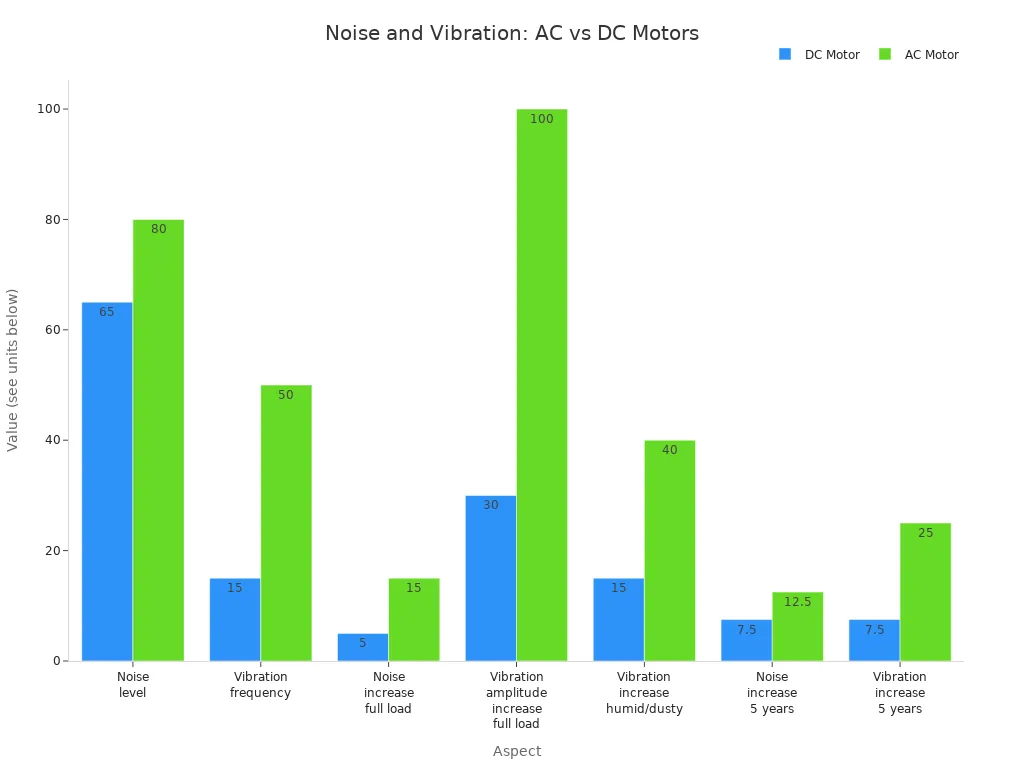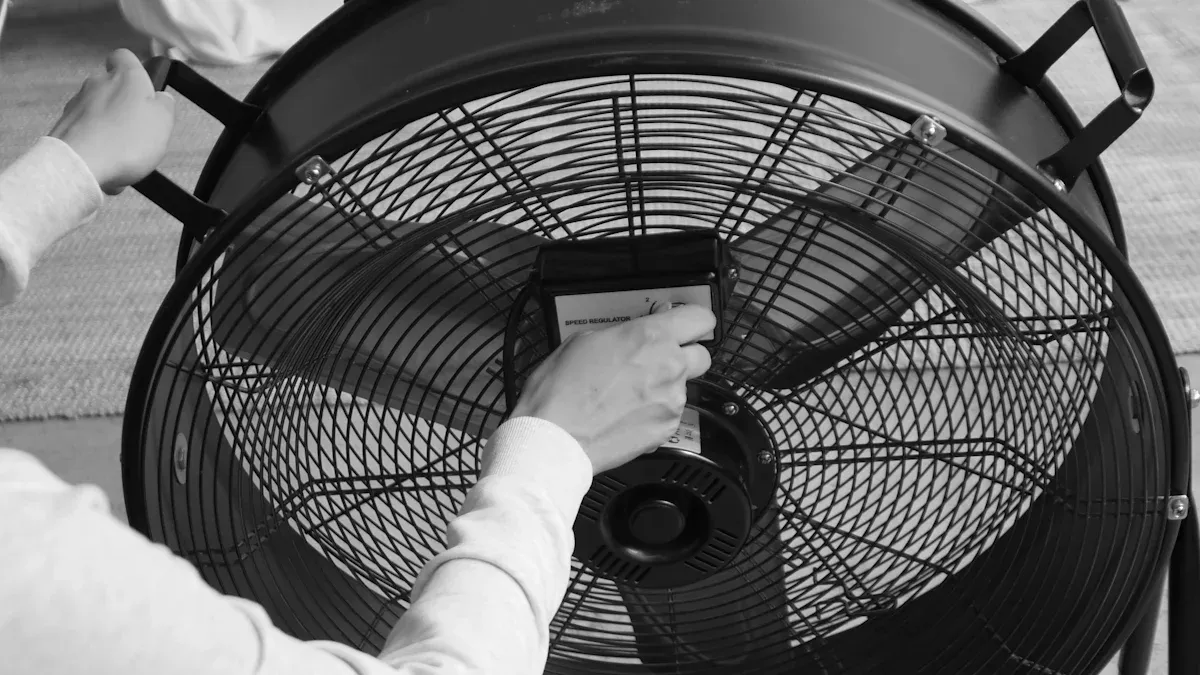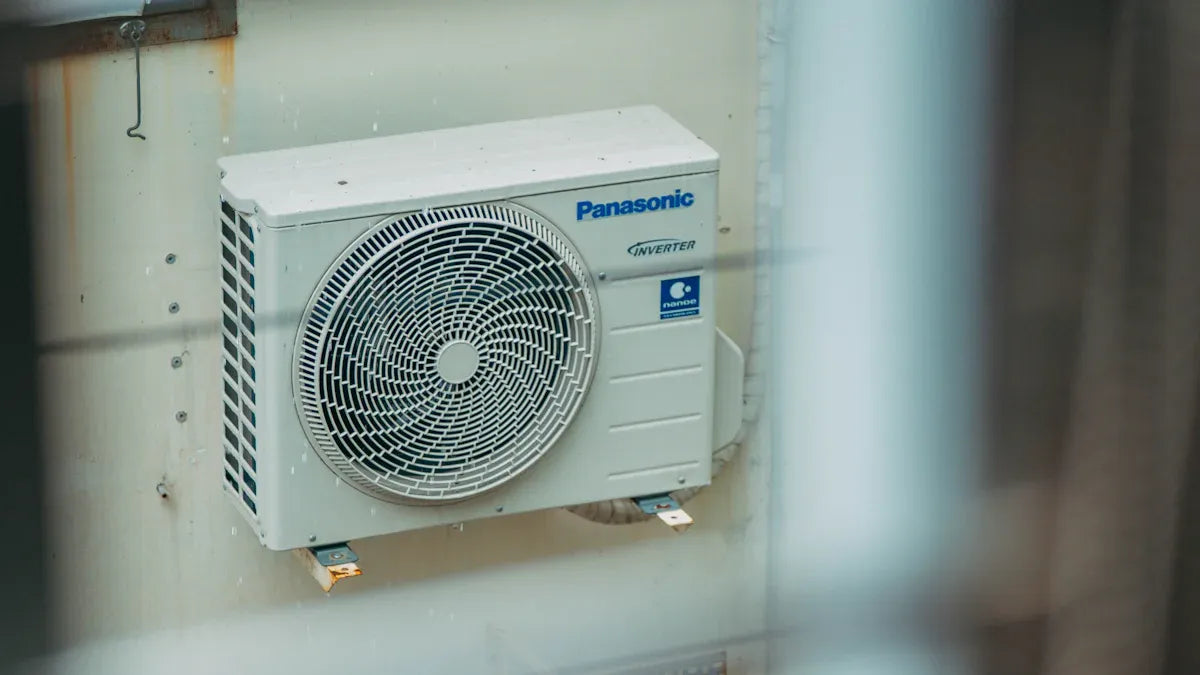If you want a quiet home, you should know that DC motors are usually quieter than AC motors in most appliances. Many buyers care about noise, especially when using products like vacuum cleaners or washing machines every day. In fact, over half of people surveyed say they want less noise from their home appliances. A quiet motor can make your living space more comfortable and help you enjoy your home without unwanted sounds. When thinking about an AC or DC motor quieter, you will notice a real difference in your daily routine.
Key Takeaways
- DC motors, especially brushless types, run much quieter than AC motors in most home appliances.
- Brushless DC motors reduce noise by eliminating brushes, lowering friction, vibration, and electrical noise.
- AC motors create more noise due to magnetic forces, mechanical parts, and vibrations, especially at higher speeds.
- Choosing appliances with brushless DC motors or inverter technology helps reduce noise and save energy.
- Regular maintenance like cleaning and lubricating motors keeps appliances running quietly longer.
- DC ceiling fans are quieter, use less energy, and offer more speed options than AC ceiling fans.
- Look for noise ratings, Quiet Mark certifications, and user reviews to find the quietest appliances.
- Balancing noise level, cost, and energy efficiency helps you pick the best appliance for a peaceful home.
AC or DC Motor Quieter
Noise Levels Overview
When you compare ac or dc motor quieter in home appliances, you will notice a clear difference in noise levels. Manufacturers use standardized methods to measure and report these noise levels, so you can trust the information on product labels. Here is how they do it:
- They measure noise emissions using the A-weighted sound power level, following the IEC 60704 series.
- You will often see noise levels listed on packaging or in manuals, usually in decibels (dB).
- In Europe, the EU Energy Label requires sound power level values for household appliances.
- If the noise at the workstation goes above 70 dB(A), manufacturers must publish the sound pressure level.
- Accredited labs and national bodies, like NIST, help ensure these measurements are accurate.
This approach gives you reliable data when choosing between ac vs dc motors for a quiet home. You can compare the noise level of different appliances and pick the quietest option for your needs.
Why DC Motors Are Quieter
You will find that dc motor designs lead to quieter operation in most home appliances. The main reason is the difference in how these motors work. Brushless dc motors stand out for their quiet performance. They do not use brushes, so they avoid the friction and sparking that create extra noise in brushed motors. This design also means less vibration and smoother movement.
- DC motors have a simpler internal structure, which leads to less wear and tear.
- Brushless dc motors reduce mechanical noise compared to brushed types.
- In many cases, dc motors produce about 40% less operational noise than ac motors in precision equipment.
- Small appliances with dc motors run 10%-15% more quietly than those with ac motors.
- Vacuum cleaners with dc motors can be up to 20 dB quieter than those with ac motors.
The table below shows how brushless dc motors eliminate common sources of noise found in brushed motors:
|
Noise Type |
Cause in Brushed Motors |
Effect of Brushless Design |
|---|---|---|
|
Electrical Noise |
Sparking between brushes and commutator causing EMI |
Electronic commutation eliminates sparking, reducing EMI |
|
Acoustic Noise |
Mechanical noise from brushes and commutator |
No brushes/commutator, so mechanical noise is eliminated |
|
Torque Ripple |
Abrupt switching of current causing pulsations |
Smooth electronic commutation lowers torque ripple |
|
Vibration |
Mechanical imbalances from brushes and commutator wear |
Reduced mechanical irregularities and smoother operation |
Because of these features, dc motors offer a quiet motor solution for noise-sensitive spaces. You will notice quieter operation in appliances like fans, printers, and even electric vehicles.
AC Motor Noise
AC motors, especially single-phase types, tend to be noisier than dc motors. The main sources of noise in ac motors include magnetic noise, mechanical noise, and windage noise. Magnetic noise comes from slip noise, skewing, and unequal air gaps. Mechanical noise often results from loose stator cores or worn bearings. Windage noise is caused by air moving around the motor components.
- Vibration in single-phase ac motors is a major contributor to overall appliance noise.
- Electromagnetic forces from the rotating magnetic field cause vibration.
- Harmonics in the power supply can amplify these vibrations.
- If the frequency of these vibrations matches the natural frequency of the appliance, resonance can make the noise even louder.
- The way the motor is built also matters. For example, plastic motors with encapsulated stators reduce vibration and noise compared to iron shell motors.
You may notice that ac fans are noisier than dc fans, especially at higher speeds. Managing these vibrations and mechanical noises is important for reducing the noise level in your home appliances. When you compare ac vs dc, you will often find that dc motors provide a much quieter experience.
AC vs DC: Noise Level Factors

Motor Design
When you compare ac vs dc motors, you will notice that motor design plays a major role in how much noise you hear. Some designs, like brushless dc motors and permanent magnet synchronous motors, avoid the brush and commutator system that often causes extra sound. These motors run quietly and work well in devices where you want less noise, such as refrigerators or air purifiers.
Here are some key design elements that impact noise:
- Choose motor types with lower noise, like brushless dc motors.
- Improve the rotor shape and materials to reduce vibration.
- Use rigid structures and shock-absorbing materials to keep vibration from spreading.
- Adjust control systems, such as variable frequency drives, to smooth out speed changes.
- Optimize cooling fans to cut down on airflow noise.
- Use high-quality gears and good lubrication in appliances like mixers to reduce mechanical noise.
You will find that even the way a fan blade is shaped or how tightly a motor is built can change the noise level. For example, a ceiling fan with a brushless dc motor often runs much quieter than one with a traditional ac motor.
Brushless vs Brushed
The difference between brushed and brushless motors stands out when you look at noise and vibration. Brushed motors use physical contact between brushes and a commutator, which creates friction. This friction leads to buzzing sounds, mechanical wear, and electrical noise. Over time, the noise increases as the brushes wear down.
Brushless motors use electronic commutation, so they do not need brushes. This design removes the main source of friction and mechanical noise. You get smoother and quieter operation, which is why many modern appliances, like high-end fans and cordless vacuum cleaners, use brushless dc motors.
|
Aspect |
Brushed Motors |
Brushless Motors |
|---|---|---|
|
Typical Noise Level |
60-70 decibels |
Below 50 decibels |
|
Noise at High Speed |
Exceeds 75 decibels |
Below 55 decibels |
|
Vibration Amplitude |
Up to 0.3 millimeters |
Below 0.1 millimeters |
|
Noise Increase Over Time |
Increases by ~15% after 500 hours |
Remains steady |
You will notice that brushless motors keep their noise level low even after years of use, while brushed motors get louder and rougher.
Vibration and Hum
Vibration and electromagnetic hum also affect the ac vs dc noise experience. AC motors, especially induction types, often create a humming sound. This hum comes from the alternating magnetic field inside the motor. You might hear this in older refrigerators or air conditioners, where the ac motor produces a steady buzz. The hum can get louder if the motor has an uneven air gap or worn bearings.
DC motors, especially brushless types, have a steady magnetic field. This means you will not hear the same kind of hum. Vibration in dc motors stays lower and more stable, even under heavy use. For example, in a modern washing machine with a brushless dc motor, you will notice less shaking and a quieter wash cycle compared to older models with ac motors.

Tip: If you want a quieter home, look for appliances with brushless dc motors. These motors keep vibration and noise low, even as the appliance ages.
Noise in Home Appliances

Appliance Types
You will find that different home appliances use either AC or DC motors based on their needs. Large appliances like washers, dryers, and refrigerators often use AC motors because they handle high power and run at fixed speeds. AC ceiling fans are also common in many homes due to their simple design and ability to connect directly to household power. On the other hand, DC motors, especially brushless types, appear in appliances that need precise speed control or battery operation. You will see DC motors in cordless vacuum cleaners, mixers, and some modern fans.
When you compare dc ceiling fans to ac ceiling fans, you will notice a clear difference in noise levels. DC motor ceiling fans run much quieter than ac motor ceiling fans. DC ceiling fans also use less energy and offer more speed options. AC ceiling fans remain popular because they are cost-effective and easy to install, but they tend to be noisier. If you want a peaceful home, choosing a dc ceiling fan can make a big difference.
|
Appliance Type |
Typical Motor Used |
Noise Level (dB) |
Notes |
|---|---|---|---|
|
Ceiling Fan |
AC/DC |
20-35 |
DC ceiling fans are quieter |
|
Mixer/Blender |
Universal (DC) |
65-80 |
DC motors allow variable speed |
|
Refrigerator |
AC/DC (Inverter) |
32-47 |
Inverter (DC) models are quieter |
|
Air Conditioner |
AC/DC (Inverter) |
40-60 |
DC inverter units reduce noise |
|
Vacuum Cleaner |
DC |
60-75 |
Cordless DC models are quieter |
Tip: For a quieter home, look for appliances with brushless DC motors or inverter technology.
Speed and Control
Speed settings and smart controls play a big role in how much noise you hear from your appliances. DC ceiling fans stand out because they offer more speed options and smoother control than ac ceiling fans. You can adjust a dc ceiling fan to run at very low speeds, which keeps your home quiet. DC motor ceiling fans also respond faster when you change settings, making them more comfortable to use.
Modern appliances like refrigerators and air conditioners now use inverter technology. This means the motor can change speed based on what your home needs. Instead of turning on and off with a loud click, these appliances run smoothly and quietly. You will notice less noise in your home, especially at night or during quiet times. AC ceiling fans usually have fewer speed options and can get noisy at higher settings.
Note: Smart controls let you schedule when your dc ceiling fan or other appliances run, so you can enjoy a quiet home when you need it most.
Aging and Maintenance
As appliances get older, you may notice more noise. Both AC and DC motors can get louder if you do not take care of them. Dust, dirt, and worn bearings can cause extra vibration and humming. You should check your dc ceiling fan and other appliances regularly for signs of wear. Cleaning the motor, lubricating moving parts, and making sure everything is mounted tightly can help keep noise low.
If you hear new sounds from your ac ceiling fan or dc ceiling fan, it might be time for maintenance. Listen for rattling, buzzing, or grinding. These sounds often mean you need to clean or lubricate the motor. Keeping your home appliances in good shape will help them stay quiet and last longer.
- Inspect motors for dirt and debris.
- Lubricate bearings and moving parts.
- Check for loose mounting or wiring.
- Avoid using appliances in dusty or damp areas.
Regular maintenance helps your dc ceiling fans and other home appliances stay quiet and efficient.
Other Factors Beyond Noise
Cost
When you compare AC and DC motors, you will notice a clear trade-off between cost and performance. AC motors usually cost less at the start. Their simple design means you pay less for both the appliance and future repairs. DC motors, especially brushless types, have a higher upfront price. This is because they use more advanced technology and require more complex parts. However, you get more than just a quiet motor for your money.
- DC motor appliances often reduce electricity use by up to 70%. Over time, this can save you a lot on your energy bills.
- DC motors need less maintenance. They have fewer parts that wear out, so you spend less on repairs.
- The higher initial cost of a DC motor can pay off in the long run through lower running costs and fewer service calls.
|
Feature |
AC Motor (Traditional) |
DC Motor (Brushless) |
|---|---|---|
|
Upfront Cost |
Lower |
Higher |
|
Maintenance |
Low |
Very Low |
|
Energy Use |
Higher |
Lower (up to 70% less) |
|
Lifespan |
Shorter |
Longer |
Tip: If you want an energy-efficient home, consider the total cost over the appliance’s lifetime, not just the sticker price.
Efficiency
You will find that DC motors lead the way in making appliances more energy-efficient. These motors adjust their power use to match what the appliance needs. For example, a DC fan uses about 31.8 watts, while a similar AC fan uses 50.8 watts. This difference means you spend less on electricity each year. DC motors also offer precise speed control, which helps keep your appliances running smoothly and quietly.
AC motors work best at a constant speed. They use more energy and do not adjust as easily to changing needs. DC motors, especially brushless types, are common in energy-efficient appliances like inverter air conditioners and modern refrigerators. These appliances use less power and create less heat, which helps the environment and your wallet.
- DC motors are more energy-efficient because they waste less power as heat.
- You get better performance and lower noise at the same time.
- Energy-efficient appliances often last longer and need fewer repairs.
User Experience
You will notice a big difference in user experience when you choose energy-efficient appliances with DC motors. These appliances run quietly, so you can relax or sleep without background noise. Many users say that low noise is one of the most important features in products like dishwashers and fans. People also care about how the sound feels, not just how loud it is. Smooth, soft sounds are less annoying than sharp or rough noises.
Energy-efficient appliances with DC motors often come with smart features. You can control them with a remote or set schedules for when they run. Adjustable settings let you pick the perfect speed or temperature for your comfort. High user satisfaction ratings show that people enjoy the quiet, smooth operation and easy controls of these appliances.
Note: When you shop for new appliances, look for energy-efficient models with brushless DC motors. You will get a quieter, more comfortable home and save money over time.
Choosing the Quieter Option
When to Prioritize Noise
You should think about noise levels when shopping for new appliances, especially if you live in a smaller space or have an open floor plan. Many people now prefer a quiet home, and surveys show that over 80% of buyers want appliances that make less noise. If you work from home, have young children, or are sensitive to sound, you may want to put noise reduction at the top of your list. Noise is not just about how loud something is. The type of sound—like sharpness or roughness—can also affect your comfort and stress levels.
You can use the decibel ratings found on product labels to compare how loud different appliances are. These ratings follow international standards, so you can trust them. Look for certifications like Quiet Mark, which test and verify the quietest products. If you plan to place appliances near bedrooms or living areas, choosing models with quiet operation becomes even more important. For example, a dc ceiling fan with low noise is ideal for bedrooms, helping you sleep better at night.
Tip: Always check where you will put your appliance. Placing noisy machines away from quiet zones, like bedrooms, can make a big difference.
Tips for Quiet Appliances
You can take several steps to make sure your home stays peaceful. Start by looking for appliances that advertise quiet operation or have a Quiet Mark certification. These products have been tested for low noise and often use special technology, such as brushless DC motors or inverter drives, to keep sound levels down. Some brands use soundproofing or insulated motors to reduce noise even more.
Here are some practical tips to help you choose and use quiet appliances:
- Check the decibel rating on the label. Lower numbers mean quieter machines.
- Look for features like brushless DC motors, inverter technology, or sound shields.
- Choose a dc ceiling fan for rooms where you want less noise.
- Use sound isolation pads under washing machines or dishwashers to cut down on vibration.
- Place appliances away from walls or bedrooms to reduce noise transfer.
- Read consumer reviews to see if others mention quiet operation.
- Make sure appliances are installed correctly and kept level to avoid extra noise.
Note: Even if you cannot buy the most expensive model, you can still find quiet options at different price points. Manufacturers now offer quiet appliances for every budget.
By following these tips, you can create a home that feels calm and comfortable. Quiet appliances not only improve your daily life but also help you relax and focus, especially in spaces that are ideal for bedrooms or study areas.
You now know that DC motors usually run quieter than AC motors in home appliances. If you want a peaceful home, choose appliances with brushless DC motors or inverter technology. Look for features like low decibel ratings, smart controls, and Quiet Mark certifications.
Remember: Balance your need for quiet with your budget and energy savings. The best appliance fits your lifestyle and keeps your home comfortable.
FAQ
Are DC motors always quieter than AC motors in every appliance?
You will usually find DC motors quieter, especially in modern appliances. Some high-quality AC motors can run quietly, but DC motors with brushless designs often produce less noise and vibration.
Why do DC ceiling fans make less noise than AC ceiling fans?
DC ceiling fans use brushless motors. These motors reduce friction and vibration. You get smoother operation and less humming, even at higher speeds.
Can I replace an AC motor with a DC motor in my appliance?
You cannot easily swap AC for DC motors. DC motors need different wiring and controls. Always check with a professional before making changes.
Does inverter technology help reduce appliance noise?
Yes, inverter technology lets motors adjust speed smoothly. You will notice less noise because the motor avoids sudden starts and stops. Many modern refrigerators and air conditioners use this feature.
How can I tell if an appliance uses a DC motor?
You can check the product label or manual. Look for terms like "brushless DC," "BLDC," or "inverter motor." Some brands highlight quiet operation as a feature.
Will my appliance get noisier as it gets older?
Yes, most appliances get louder over time. Dust, worn bearings, and loose parts increase noise. Regular cleaning and maintenance help keep your appliances quiet.
What should I look for when buying a quiet appliance?
Look for these features:
- Brushless DC motor or inverter technology
- Low decibel rating (dB)
- Quiet Mark or similar certifications
- Positive reviews about noise levels
